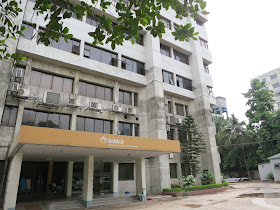 Although half the people I meet in North America do not know where or what Bangladesh is, my decision to come here was an easy one. You see, I am a Bangladeshi by birth. I was born and raised right here in Dhaka, until one day, more than 8 years ago, my parents decided to immigrate to Toronto. And so when I was debating where I can spend the "last summer of my life" I was naturally pulled to Dhaka, Bangladesh.
Although half the people I meet in North America do not know where or what Bangladesh is, my decision to come here was an easy one. You see, I am a Bangladeshi by birth. I was born and raised right here in Dhaka, until one day, more than 8 years ago, my parents decided to immigrate to Toronto. And so when I was debating where I can spend the "last summer of my life" I was naturally pulled to Dhaka, Bangladesh. Today is Thursday, and I just completed my first week at icddr,b. icddr,b (or International Centre for Diarrhoeal Disease Research, Bangladesh) is a hospital that opened its doors in 1962 and ever since then has provided lifesaving care at no cost to the patients. Bangladesh, if you didn't know already, is a developing country and is riddled with all the problems that comes with that title. It is, thus, not surprising that cholera is still an ongoing problem. Indeed, there is a cholera epidemic going on right now (the pre-monsoon epidemic).
The locals here know icddr,b as the cholera hospital and so if they are experiencing diarrhoeal symptoms they know where to go for free care. My first day here, the ER saw 547 new patients alone and I was told that last week they saw around 1000 new patients everyday. The policy here is no patient will be turned down and so there are huge tents set up outside the hospital building to accommodate these huge number of patients..
Now for a quick overview of what happens at icddr,b. Patients if they are able to walk and talk, that is they are not severely dehydrated, are triaged. They first get registered, then see a nurse, and then they see the doctor who will decide where they should go. Now, the surprising thing is, that all of this happens within 10 minutes because all three off these stations are in one room (the ER). The doctor might send them to the OPD (Outpatient Department) where there is a nurse and healthcare worker who oversees mothers feeding their babies ORS (Oral Rehydration Saline). The OPD is mainly for infants (who have no signs of dehydration) and their mothers. The mothers are encouraged and taught how to feed their babies ORS and bread/banana (for Potassium) properly.
For patients, who have signs of dehydration (mild to moderate) or any other complications, they are sent into the hospital SSU (Short Stay Unit), and there they are either given IV fluids or ORS if they are not vomiting. For patients who have other problems, such as respiratory problems, malnutrition, other GI problems (such as diarrhea that has been ongoing for several weeks/months), they are sent to the LSU (Long Stay Unit). If the child is in critical conditions, they are sent to the ICU. Finally there are patients who come in on a stretcher or wheelchair (severely dehydrated), and they are directly given a bed in the ER and IV fluids are started immediately.
I spent my first week getting a handle of all these departments and how they function. Next week, I am going to start focusing on individual departments and joining each of their teams.
After a very busy week at the hospital, I am going to enjoy my weekend (the weekends here are Friday and Saturday) spending time with my relatives and friends. So far, it has been an amazing and eye opening experience and I can't wait to go back to the hospital 8:30 am Sunday!
For patients, who have signs of dehydration (mild to moderate) or any other complications, they are sent into the hospital SSU (Short Stay Unit), and there they are either given IV fluids or ORS if they are not vomiting. For patients who have other problems, such as respiratory problems, malnutrition, other GI problems (such as diarrhea that has been ongoing for several weeks/months), they are sent to the LSU (Long Stay Unit). If the child is in critical conditions, they are sent to the ICU. Finally there are patients who come in on a stretcher or wheelchair (severely dehydrated), and they are directly given a bed in the ER and IV fluids are started immediately.
I spent my first week getting a handle of all these departments and how they function. Next week, I am going to start focusing on individual departments and joining each of their teams.
After a very busy week at the hospital, I am going to enjoy my weekend (the weekends here are Friday and Saturday) spending time with my relatives and friends. So far, it has been an amazing and eye opening experience and I can't wait to go back to the hospital 8:30 am Sunday!



No comments:
Post a Comment